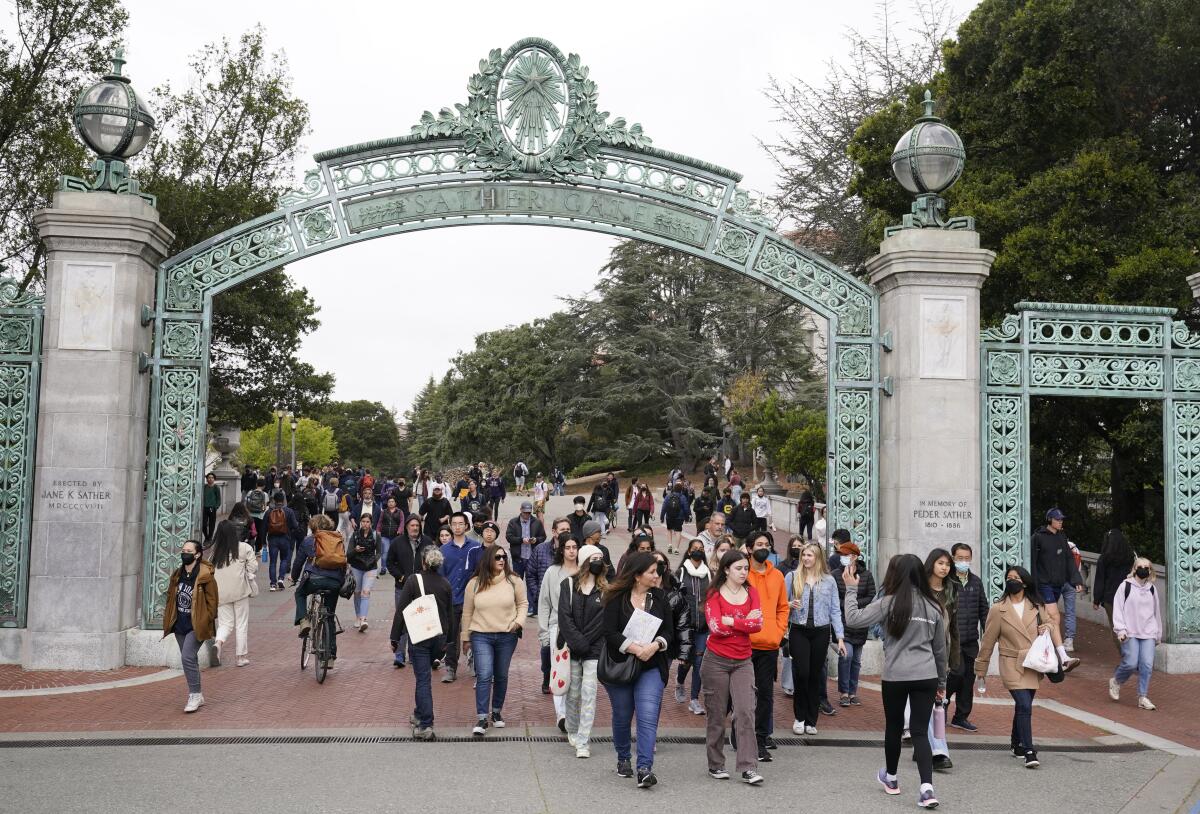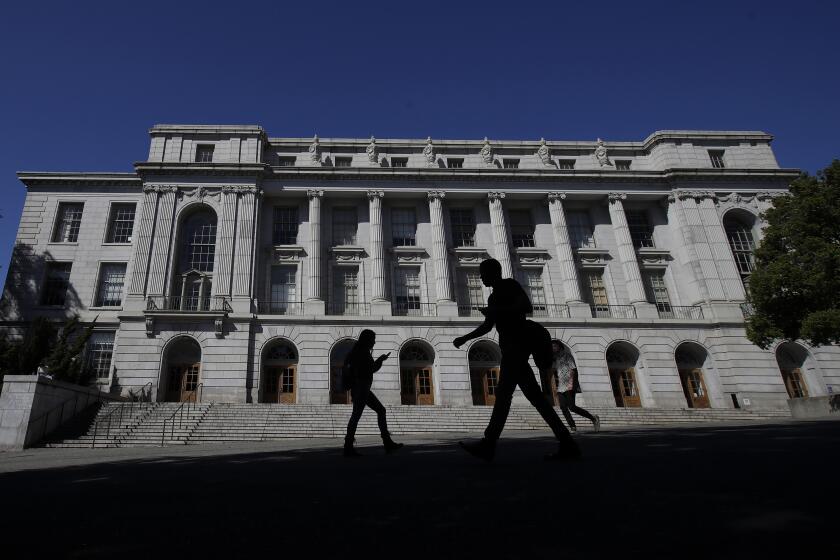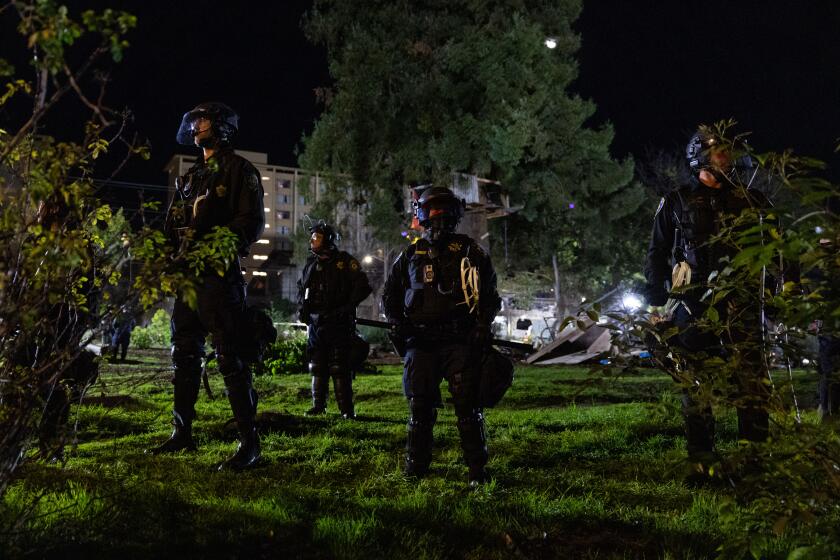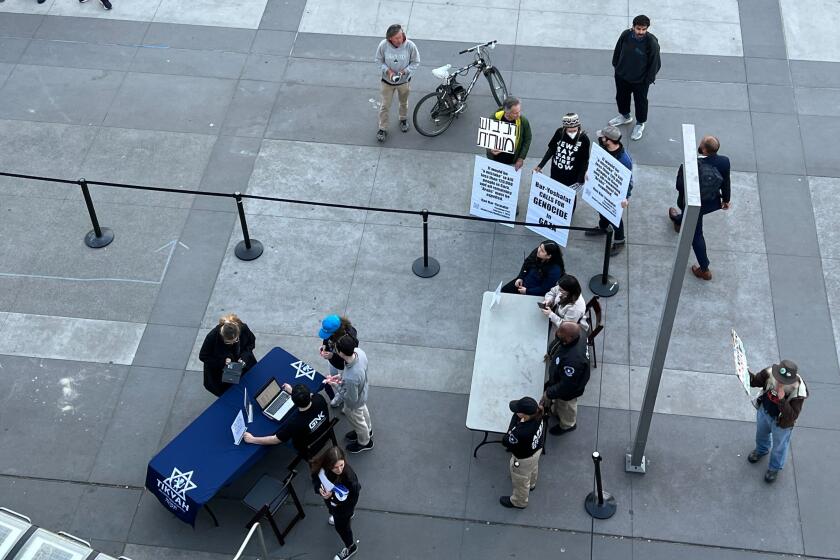Column: I wanted to hate what UC Berkeley parents are doing in the name of safety, but I can’t

- Share via
At first blush, the idea that parents of adult college students would hire a private security force to patrol areas around the campus of a public university seems like the ne plus ultra of helicopter parenting.
I mean, seriously?
Why not just hire a bodyguard for your kid?
Last year, parents of students at UC Berkeley launched the nonprofit SafeBears, with the goal of pressuring the university to find ways to increase the safety of its students.
Alarmed by the fatal October 2022 shooting of a youth minister on fabled Telegraph Avenue near campus, and the return of crime to normal or above-normal levels in the wake of the COVID-19 pandemic — including a shooting in February on Cal’s main thoroughfare, Sproul Plaza — the parents began to raise their voices about whether their kids were safe.
And then they did something that would seem to confirm this era as the one in which parents go totally overboard: They raised $40,000 and hired a private firm to provide enhanced security around dorms and the south side of campus for what they called a pilot program.
For two and a half weeks in March, a 30-year-old company called Streetsplus dispatched six unarmed “ambassadors” on foot and on bicycles between 6 p.m. and 3 a.m. A Streetplus executive told me the company provides cleaning, safety and hospitality services to 75 clients, almost exclusively in business improvement districts, which are set up by local businesses. The ambassadors undergo some training and background checks. With rare exceptions, they do not carry weapons, and they do not physically intervene in situations.
Frustrated with security concerns, some parents paid for private security at UC Berkeley. The university is not happy.
Detractors — and numerous lawsuits — maintain that security personnel in business improvement districts routinely overstep their authority to harass homeless people or exclude them from public spaces.
That’s not exactly the issue here, since the goal is to protect students, not to improve business conditions.
Last week, my colleagues Salvador Hernandez and Nathan Solis reported that Berkeley administrators are not happy about the private parental effort. They have shared their disapproval in a statement: “Parents who want to donate funds toward additional campus security can do so via a university fund that has been established. We do not believe that private security should take precedence over hiring sworn officers.”
And yet, SafeBears founder and President Sagar Jethani, the father of twin sons who are Cal sophomores, told me Monday, the group has not really gotten much pushback.
The multimillion-dollar cost for UC Berkeley of walling off People’s Park will grow with bills from outside agencies and continued security to keep people out.
“I’ll be honest, that was my worry when we began,” he said. “That we would be seen as a bunch of helicopter parents having a hard time letting little Johnny go.”
Of course, there’s no way to know whether any crimes did not occur as a result of the ambassadors’ presence on the streets of Berkeley, but at least one assault was thwarted when a SafeBears ambassador interrupted an attack on a young woman by a man who then fled in a car with friends. The ambassador caught a few moments of the altercation on video.
The victim did not contact police or offer details about what led to the attack, Jethani told me. “We’re horrified that this happened,” he told the news site Berkeley Scanner. “But it’s also significant that one of our private security guards was able to take a bad situation and stop it from getting worse.”
Listen, as a parent, I totally understand worrying about the safety of your child, even your adult child. Sending a kid off to college is a fraught exercise for most families. But crime around college campuses — particularly urban ones — is nothing new.
Pro-Israeli groups at UC Berkeley rescheduled a controversial speaker to Monday after the same event was canceled amid violent protests last month.
It turns out the Berkeley program is modeled after one at USC, the Yellow Jackets, which USC created in 2009. In 2012, after some high-profile crimes, including the killings of two Chinese graduate students as they sat in their car a mile from campus, USC ramped up its safety program, using security personnel in bright outerwear to help keep students safe both on campus and off. Yellow Jackets are unarmed but carry radios to communicate with USC’s police department.
But from Jethani’s perspective, the situation at Cal is different than it has been in the past. By some estimates, the crime rate on and adjacent to the UC Berkeley campus is among the highest in the nation.
After George Floyd’s murder by Minneapolis police officers in 2020, Jethani told me, UC Regents responded to the call to defund the police by producing a UC Community Safety Plan, which he described as “a new vision for how to protect members of the UC community without simply relying on officers.”
University of California regents delayed action on a controversial proposal to control political opinion, such as criticism of Israel, from campus websites.
Cal only got halfway there; the campus police department has barely half the officers it did a few years ago, 47 vs. 80. But the police department has not yet been supplemented with non-sworn staff as the plan calls for, so many have been left feeling that the campus and its environs are underpatrolled and vulnerable.
Some parents of older college students told Jethani that his mission is futile. “They said, ‘Sit down, Grasshopper. You will whinge to the school and demand meetings and they will say they hear your concern and nothing will happen,’ ” he said. “ ‘And your kids will graduate and you will move on.’ I thought, ‘Is there any way to break this cycle of inaction?’ ”
I tried, but I can’t find it in my skeptical heart to condemn the actions of the SafeBears parents.
They want their college-age children not just to feel safe but to be safe. Who can argue with that?
More to Read
A cure for the common opinion
Get thought-provoking perspectives with our weekly newsletter.
You may occasionally receive promotional content from the Los Angeles Times.
















